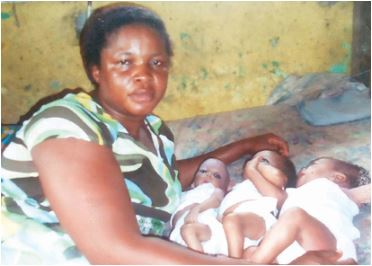This is quite touching. It was mixed blessings for Ifeanyi Amadi and his wife, Precious, when she put to bed on 27th of December, 2017.
In an encounter with Vanguard, 38-year-old Precious who hails from Ananbra State, said she and her husband had reason to be concerned and not be too joyful because they already had three children – aged between nine and 13. The triplets brought their children to six.
“I was not planning to have any more children due to the situation in Nigeria. My first daughter is 13, the next, a boy, 11, and the other boy is nine. I was utilising the rhythm method of family planning at that time. Before that time, I had been using the contraceptive ring, but it caused me to bleed too much. At a point, when I almost bled to death, I was compelled to have it removed.”
Precious recalled that when she was initially introduced to the ring, she was instructed to renew it every three months, but it didn’t suit her. During her menstrual cycle, it caused her to bleed heavily so she returned to the private hospital where she obtained the device,
“At the hospital, they advised me to change to an injection contraceptive but I was afraid of injections. Later, I opted for the rhythm method because it had always worked for me. The family planning providers even showed me how I would be counting the days and I did as I was told. It worked well for two years, but eventually failed.”
Precious is among millions of married Nigerian women with generally high and increasing unmet need for contraceptives. According to the 2016/2017 Multiple Indicator Cluster Survey, MICS, the unmet need for this category of women in the South-West zone of Nigeria is 26.4 per cent, compared to 12.4 per cent in 2007 and 21.1 per cent in 2011.
Not surprisingly, the Contraceptive Prevalence Rate, CPR, or use of contraceptives among Nigerian women of reproductive age (15-49 years) that are currently married or in a sexually active union and using a contraceptive method, is generally low and reducing.
From the MICS data, the CPR for the South- West zone shows gradual decrease from 35.2 per cent in 2007 to 28.6 per cent (2011) and 25.8 per cent in 2016/2017.
Precious continued: “When I realised I was pregnant, I was not happy at all because I was not planning to get pregnant. It was the family planning method I was using that failed and I had an unintended pregnancy. But when scans later confirmed that I was carrying triplets, I nearly collapsed from the news. It is hard enough catering for three children not to talk of six. I knew immediately that we were in trouble.”
Precious, who was then a teacher in a private primary school, said soon after she gave birth, her appointment was terminated.
“Ï am a trained teacher. I have my National Certificate of Education, NCE, qualification. I have been teaching for over 13 years and I was a teacher in that school for almost eight years.
“After I gave birth at the General Hospital at Ajeromi Local Government, Lagos, I was given only four weeks maternity leave by my employer. But it was not enough. I couldn’t resume work after four weeks because it was not an easy period for me at all, particularly because I gave birth through Caesarean Section.”
After the four weeks elapsed, Precious who said she was earning N18, 000 per month, decided to go back to her employer to seek permission for more time with her babies.
“I didn’t expect to get the normal three months, but I needed more time at home until my babies were stronger. To my surprise, when I went back to the school, I was told my services were no longer needed. It was then I discovered I had already been replaced and my salary stopped.”
Shortly before the babies were born, Precious had become the bread winner because Ifeanyi, her husband, a jewel merchant, had lost his shop in Idumota, Lagos, to developers. The couple is currently jobless and going through harrowing times with their six children.
Asked if she is now on any family planning method, Precious said: “When I was about to be wheeled into the theatre for the operation to deliver the triplets, I spoke with the doctor, who also had a word with my husband and it was agreed that my tubes should be tied. So my tubes are tied. It is now permanent family planning.
“Even to feed is a great challenge most times. We owe so much debt and our rent is more than one year overdue,” Precious said regretfully. Noting with a smile that the triplets are a blessing, she, however, admits that caring for them is a huge burden.
“They are now about five months old. Even breastfeeding them is a tough task because they are always hungry. Doing exclusive breastfeeding is out of it, so I have started them on infant formula when we see it. We cannot afford to buy formula, people often donate it or give us money to buy the formula.
“We want to raise them ourselves but circumstances are beyond our control. Their need is too great for my husband and I to handle alone because we are jobless. Although the grown children are going to school, we cannot really do much for them at the moment because we are financially constrained.
“My husband’s business has been stalled because the shop where he was trading was taken over by developers. He lost his goods in the process and is only still hoping for a miracle. We have spent all we have in taking care of the children. Right now, we don’t know what to do. We intend to take care of them as parents but seeing what is around us makes it very difficult.
“I’m at home all the time now and my husband isn’t doing anything tangible either. People have been helping us with donations but it has not been easy. We are helpless and want to work in order to care for our children. We are concerned about their future.
“I’m ready to work if employed. The triplets are bigger now and I can cope. My husband is also seeking employment. We are appealing to Nigerians to please assist us for the sake of our children.”
If you are touched by her story please contact Ifeanyi and Precious on: 08167949814























